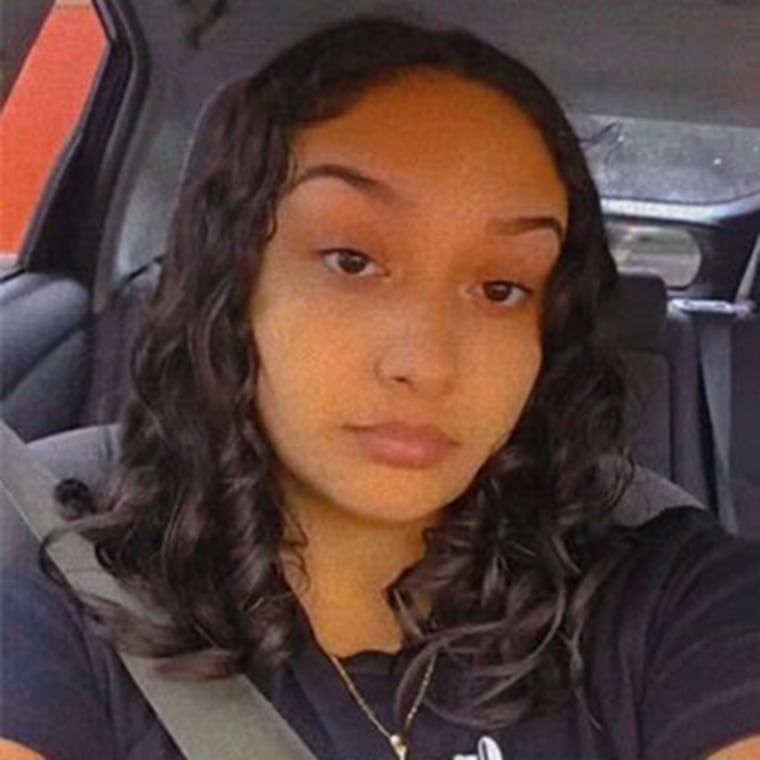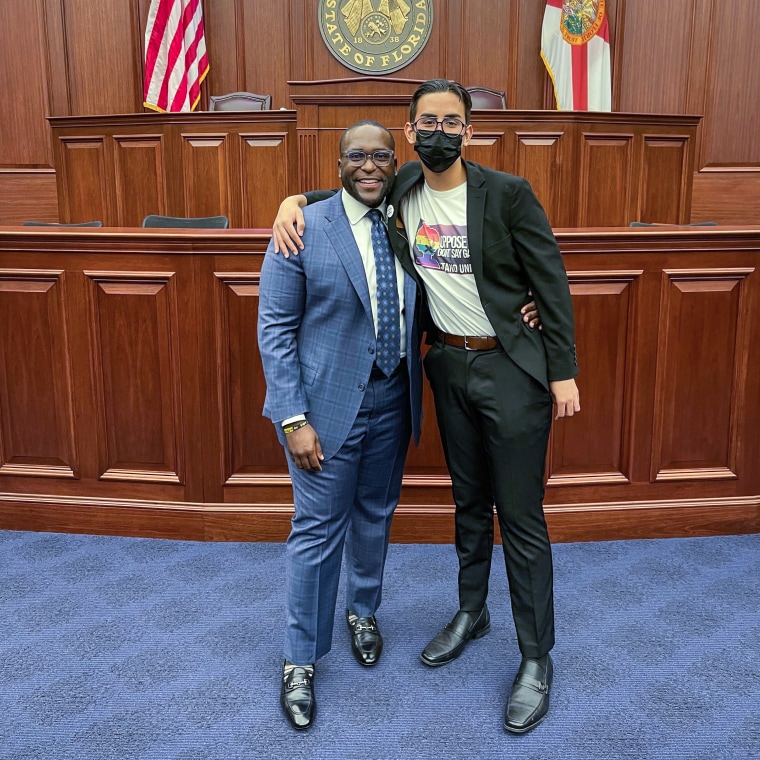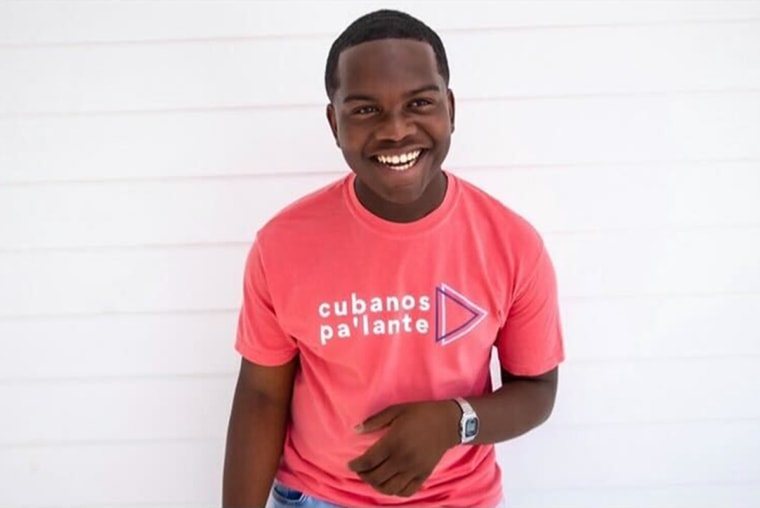Black, Latino queer students say they are on edge in the wake of ‘Don’t Say Gay’ bill
Miami eighth grader Zen Nelson, who is Afro Latinx and uses gender-neutral pronouns, said they have been subjected to homophobic slurs from their classmates for at least the past four years.
Zen said they didn’t bring this up to school administrators because they feared their complaints would not be taken as seriously as those of their white and wealthier peers who were harassing them.
Now, as the Florida Gov. Ron DeSantis, a Republican, prepares to sign the the Parental Rights in Education bill — dubbed the “Don’t Say Gay” bill by critics — Zen worries that school will become an even more hostile environment.
“Every day, every class, I make a choice on, ‘Am I going to speak out about this?’ Zen, 13, told NBC News. “Every time, when I make that choice, it is terrifying … the passage of this bill will exacerbate everything that makes me scared to go to school.”
Students of color in Florida, like Zen, say they have been on edge as the “Don’t Say Gay” bill advances in the state. The measure would ban classroom instruction on sexual orientation or gender identity “in kindergarten through grade 3 or in a manner that is not age-appropriate or developmentally appropriate for students in accordance with state standards.” Critics say the “age appropriate” part of the bill is overly vague and could allow the ban to be enforced well past the third grade.
This proposed legislation passed both chambers of the Florida Legislature shortly before passing of the Stop the Wrongs to Our Kids and Employees Act, or the Stop WOKE Act, which is also expected to be signed by DeSantis. This measure would prohibit the teaching of critical race theory — a decades-old academic framework that recognizes how racism is upheld in America’s institutions and policies — in grades K-12.
With more than half of Black LGBTQ students saying they feel unsafe in school due to their sexual orientation and gender identity, according to a 2020 survey from the LGBTQ youth advocacy group GLSEN and the National Black Justice Coalition, advocates say the “Don’t Say Gay” bill will have an outsize effect on students of color.
“This legislation is a direct attack on LGBTQ+ kids, undermining their mental and emotional health, and fostering an environment of intolerance and ignorance,” David Johns, the coalition’s executive director, said in a statement, adding that Black LGBTQ kids “who already face barriers to feeling safe and supported at schools, those harms will be amplified tenfold.”
Regina Livingston, a Black transgender woman and the founder of the trans advocacy group Unspoken Treasure Society, said students of color are already scared about this proposed legislation’s effect on their safety.
“It’s going to be catastrophic,” Livingston said. “Children are panicking because they shouldn’t have to feel uncomfortable in school, and I feel like this is a gateway to more to come.”
‘A form of erasure’
Tatiana Williams, executive director of Transinclusive Group, worries that the measure, once it’s enacted, will contribute to an increased risk of suicide. She also said it would make students of color feel less supported.
Get the Evening Rundown
A rundown of the day’s top stories and headlines.SIGN UPTHIS SITE IS PROTECTED BY RECAPTCHA PRIVACY POLICY | TERMS OF SERVICE
“All of it is a form of erasure,” Williams said. “It forces them into a place of isolation.”
According to a 2019 survey by GLSEN, the vast majority of LGBTQ students in Florida say they regularly hear anti-LGBTQ remarks from other students, with 94 percent saying they’ve heard “gay” said in a negative way, and 72 percent saying they heard negative remarks about transgender students.
Three Latino seniors at Felix Varela Senior High School in Miami, who are also part of Safe Schools South Florida, a group advocating for LGBTQ students, said the bill is causing panic.

Denise Santiago, 18, said not teaching about LGBTQ issues will only further stigmatize LGBTQ students.
“Homophobia is bullying and now homophobia can go unpunished,” Santiago said. “Now, teaching about the 80s and the HIV/AIDS epidemic and all of that is going to go like pretty much out the window.”
Recommended

ASIAN AMERICA‘Ms. Marvel’ trailer depicts first Muslim superhero as a typical South Asian American teen

RUSSIA-UKRAINE CONFLICTUkraine-Russia war live updates: E.U. leaders visit Kyiv amid crisis
Sophia Ramirez, 18, slammed the bill as childish, adding that this is a step in the wrong direction.
“We will be going backwards,” Ramirez said. “It’s going to discriminate the youth and just discourage us to evolve.”
Gianna Mulle, 17, echoed these fears about the bill’s impact.
“I feel like as soon as this bill is going to be passed, I’m going to be so terrified for all of my peers,” said Mulle, who uses “she” and “they” pronouns and is a lesbian. “It’s going to hurt no matter what.”
Students push back
Earlier this month, students across Florida walked out of schools in Tampa, Orlando, Tallahassee, Miami and other cities in protest of the legislation. Javier Gomez, 17, president of the Gay Straight Alliance at Miami’s iPrep Academy, said he led a walkout to help show students that their voices matter.
“I really just wanted my school to understand how pivotal and monumental their participation is,” said Gomez, a senior, who also protested the bill at the state’s capitol. “It shows Florida legislators that this is important. This is an affected community, and we need to stand for it.”

Raymond Adderly, a senior at Fort Lauderdale High School who attended similar walkouts, said students are decrying the legislation for its outsize impact on the LGBTQ community.
“The response here has been: ‘Absolutely no, we don’t want this bill to pass. We don’t want this bill to be signed,’” Adderly, who is Black, said. “That has been the loudest cry from students across this district.”

While students are largely speaking out about the bill, Adderly said those who will not be affected by it are making jokes about it in school.
Gomez, who is gay, recalls being bullied in school for feminine characteristics. At that time, he also struggled with receiving support for his LGBTQ identity at home.
“My family was very a part of the machismo culture, and that really hurt me a lot,” he said. “I know a lot of people that come from Latin American families, and I understand their kind of really conservative views of what you can be or what you cannot be.”
However, teachers became an outlet for him after he came out, he said, adding that this provided him a sense of hope when he was in middle school.
“This is why it’s so important for counselors and teachers to have the ability to speak on this,” he said, adding that it gives LGBTQ students, “an affirming space to really talk about who they are.”